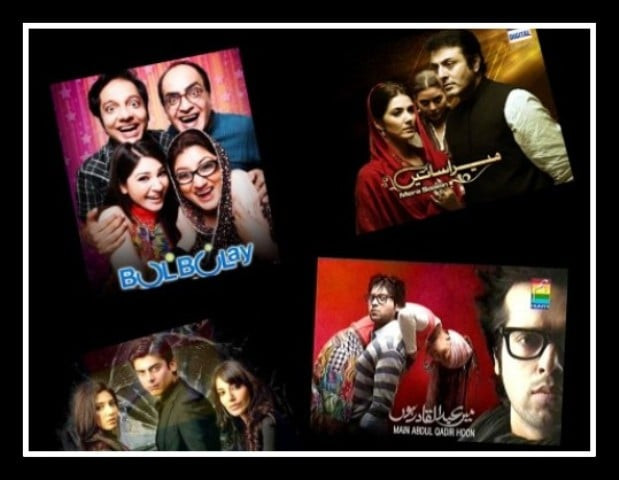Is this all that our audience is interested in? Are we really that laid-back about the content being aired? Do we actually take our masses to be that silly?
These are the same masses that watched "Ankahi" and "Tanhaiyan" and enabled these shows to get the critical acclaim they deserved. Why are we then so afraid to experiment with new themes and plots? Times are changing and people are evolving rapidly. But what about our dramas? Most are still stuck in a rut.
In order to help them break the monotony, here is me annoyingly listing ten points that I think every show in our country could do well to follow:
1. The names that get you fame
One of the first things that builds interest for a television show, apart from the number of forlorn faces staring back at you from the billboard, is its name. The title of the show has to be in line with the narrative and should, perhaps, even be witty, but it certainly should not be an entire sentence.
You clearly don’t want to be found saying “Main Abdul Qadir Hoon” and “Meri Zaat Zarra-e-Benishan” when asked about your favourite dramas.
2. Keep the tears in check
Let's face it; nobody appreciates wailing mothers and suicidal wives on their television screens (unless they are really sadistic). This is mainly because the infamous prime time has already reserved for the audience the choicest of distressing visuals, limbs and all. So keep the content in the forefront, the emotions on the side and get the cast of "Mujhay Roothnay Na Dena" some tissues.
[[http://www.youtube.com/watch?v=8gb6lMKCjQY]]
3. Show stereotypes the door
Yes, at some point in time you might want to give your villain a stubby nose and characterise him just the way you remember your school bully. A girl doesn't have to be drowning in make-up and jewellery to come across as villainous. After all, the last thing our society needs is a “if you’re well groomed, you’re a villain” message like the one portrayed in "Humsafar". So repeat this to yourself:
I shall leave yoga and other exercises out of my portrayal of the evil character, especially if I want to kill her towards the end.
4. Leave the moral lessons for the story books
No, there’s no harm in leaving an underlying message in your work of art. In fact the more “underlying” it is, the better. You don’t have to have a bearded man on a walking stick telling his children to “do good and stay away from evil”. Creating smart situations that reinforce the message instead of spelling it out for the audience actually works like a charm.
5. Leave the formulas for the pancakes
One of the television producers I talked to recently spoke about how every story just revolves around five themes as a rule - relationships, character, love, hate and revenge. However, showing hate doesn't have to revolve around mean and elaborate plans on the part of the widowed and “forever alone” characters that have nothing better than to hatch evil designs on somebody’s lamb of a wife. Also, when you’re called "Mere Qatil Mere Dildar" it doesn’t leave a lot to the imagination.
[[http://www.youtube.com/watch?v=lHIg4oXXbMw]]
6. Know your target audience, but don’t alienate everyone else
We all know how Pakistani television shows are all set to target the female audiences by loosely bringing in terms like “social issues” and “feminism” to the forefront. But how effective is your process of bringing social change if your content actually alienates half of your population – the men. Do men really have to be portrayed as either tyrannous cheats ("Mera Saeein"), rapists or hen-pecked husbands ("Bulbulay") all the time?
[[http://www.youtube.com/watch?v=UumVfr0SfvM&list=UUBc04E2AyHCNzIu6fYgBmSQ&index=10&feature=plcp]]
7. Skip the drag
We all know how long concluding messages can now be said in a matter of three alphabets (BRB, if you must know). So, there’s no point in dragging conversations in your very long television shows (commercial breaks, included).
However, give as much time to the conclusion as to the premise of a show. Just letting the husband and wife dance in the rain at the end of the show does not constitute a suitable conclusion.
[[http://www.youtube.com/watch?v=GIaxG-vOy9M&feature=related]]
8. Add more bricks
Everyone is not interested in the mindless glitz and glamour. At the end of the day, most would appreciate a meaningful, yet entertaining experience in the drama they watch. Claiming that the target audience of your shows are the “illiterate masses” is not a good enough excuse to add distressing monologues and haunting close ups without offering substance or “food for thought”. One good idea would be to leave things open to interpretation so that the content becomes more thought provoking than puke inducing.
9. Do away with the jingle of predictability
Music should be used to accentuate the feel of a show and not to give away the plot. If you use long and orchestral background scores, the audiences will know of the impending death of a character. Build curiosity, don’t kill it. In fact, if you have already surpassed the 200 episode mark, don’t bother. Chances are that the audience is already sleeping through "Yeh Zindagi Hai".
10. Pay your writers:
Yes, I think that will actually make a huge difference.



COMMENTS
Comments are moderated and generally will be posted if they are on-topic and not abusive.
For more information, please see our Comments FAQ